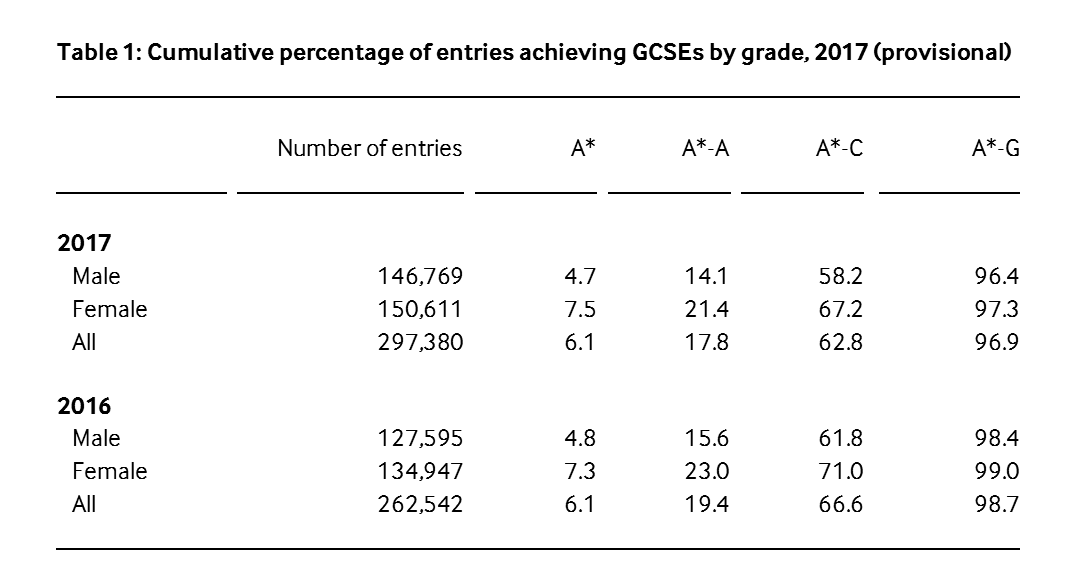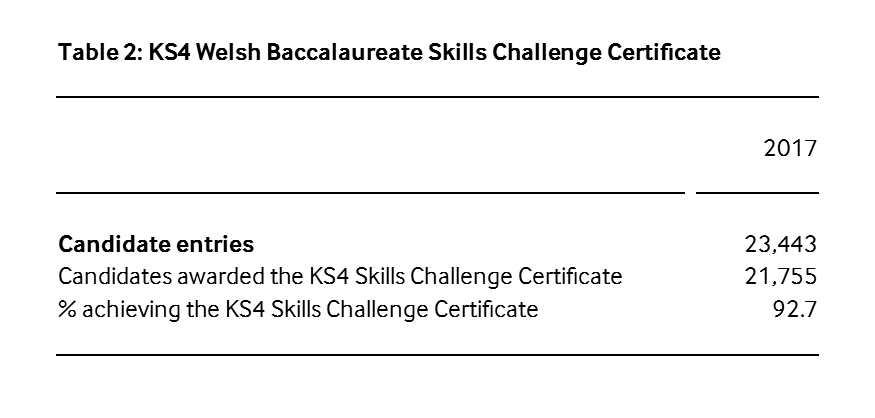Today students in Wales, England and Northern Ireland receive their GCSE results. As with last week’s A level results, the Joint Council for Qualifications (JCQ – a membership organisation of the seven largest providers of qualifications in the UK) publish summaries of the results. The JCQ data shows the collective results of the entries of the member awarding bodies.
Changes to GCSEs in Wales
There have been significant changes to the GCSE exams in English, Welsh and maths which were introduced in September 2015. These will be first results of the reformed qualifications. Full details of the changes can be seen in the Qualifications Wales guest blog. In summary:
- Maths has been split into two new exams – GCSE Maths and GCSE Maths Numeracy. Students now have a choice of three tiers of entry – foundation, intermediate and higher with each having a different set of grades available;
- In English Language 80 per cent of the qualification is based on two exam papers that focus on reading and writing. The speaking and listening assessment contributes the remaining 20 per cent towards the final grade. Written coursework that previously accounted for 20 per cent of the final grade has been removed;
- GCSE Welsh Language includes two speaking and listening assessments, a group and individual task that count 30 per cent towards the overall grade. The remaining 70 per cent is based on two exam papers that focus on reading and writing;
- In both English Language and Welsh Language the assessments are no longer tiered (foundation and higher) and all candidates sit the same exam paper. The new qualifications are also linear and students must now sit all their exams at the end of the course;
- Both the English Literature and Welsh Literature remain unitised and students can take units and resit them during the course.
Early entry
 In July this year, Qualifications Wales said that results in English, Welsh and Maths were expected to be lower than in previous years. As they stated in their blog, different entry patterns may account for lower results. For example, a substantial number of students who have taken GCSE English Language are still in Year 10. Approximately 21,000 Year 10 pupils in Wales sat the exam in June, representing around 65 per cent of all Year 10 students in Wales.
In July this year, Qualifications Wales said that results in English, Welsh and Maths were expected to be lower than in previous years. As they stated in their blog, different entry patterns may account for lower results. For example, a substantial number of students who have taken GCSE English Language are still in Year 10. Approximately 21,000 Year 10 pupils in Wales sat the exam in June, representing around 65 per cent of all Year 10 students in Wales.
Kirsty Williams, Cabinet Secretary for Education said in Plenary in July:
We also know that we have seen record early entry into this examination series. I am deeply concerned that some schools, for whatever reason, are entering children early for exams, after only one year of study of a course that should have been delivered over two years. And those students, who have the potential to get an A* maybe after two years, will get a C this summer, and those schools will settle for that C. That’s why I’ve asked Qualifications Wales to do a report into early entry, and I will take the appropriate action to ensure that early entry does not jeopardise my pursuit of high standards in our education system.
Steve Davies, the Welsh Government’s Director of Education told the Assembly’s Public Accounts Committee in May that Qualifications Wales would publish the report in September and, in light of the review, the Welsh Government would take action.
Qualifications Wales' blog article on this year’s GCSEs provides further information on the results for 16 year olds.
Changes in England
As in Wales, GCSE are being reformed in England. New GCSEs in English Language, English Literature and Maths were be taught in schools from 2015 and these are the first results from the reformed qualifications. Further GCSE subjects were to be introduced over the following two years. The changes in England include:
- A new grading scale of 9 to 1 will be used: 9 is the top grade;
- Assessment will be mainly by exam, with other types of assessment used only where they are needed to test essential skills;
- New, more demanding content;
- Courses are designed for two years of study – they will no longer be divided into different modules and students will take all their exams in one period at the end of their course.
- Exams can only be split into ‘foundation tier’ and ‘higher tier’ if one exam paper does not give all students the opportunity to show their knowledge and abilities;
- Resit opportunities will only be available each November in English Language and Maths.
The grading scale of 9 to 1 will be used for English Language, English Literature and Maths this year with most other subjects adopting numbers by 2019. The 9 to 1 grades do not directly correspond to the previous letter grades, so a grade 9 will not be directly comparable to a grade A*. Ofqual have published an infographic that shows how the number and letter grades will compare.
Previous policy changes in England (that since 2013, only a student’s first entry to a GCSE examination count in their school’s performance tables), have meant there are fewer learners who enter exams earlier than the Summer.
Results
Given the numbers of early entries in Wales, changes in qualifications in Wales and England, and increasing policy divergence between the two countries, it is difficult to make meaningful year-on-year, or country to country comparisons and any comparisons should be treated with extreme caution. The new grade scale cannot be directly compared with the old one, other than cumulatively at A/7; C/4; and G/1. Therefore comparisons across years; across reformed and unreformed subjects and across jurisdictions, can only be made at these grades.
The JCQ results only include the summer series. They do not include any early entries in the winter or re-sits and this can have a distorting effect on comparisons, particularly where more able pupils are entered early.
The data in the table below is extracted from information published by JCQ today and the data published by JCQ on GCSE results day in 2016. Data is provisional representing the position at the time that results are issued. Data is subject to checking before final data at Wales, local authority and school level is published. The results published by the JCQ relate to ‘entries’ and not to ‘candidates’. So, for example, the data can show that performance has increased or declined at GCSE or within the grades. It cannot show whether more boys or girls achieve five or more grades A*-C at GCSE. The data relates to the outcome of the individual subject areas for all regardless of their age.
Given the changes to the grading system in England, with some subjects being awarded A*-G and others being awarded 9-1, no comparisons have been made with England.
In summary:
- There has been an increase in the number of entries of 19,174 over 2016:
- The overall percentage of learners achieving grade A* remains the same as last year with a decrease of 0.1 percentage points for males and an increase of 0.2 percentage points for females;
- Between 2016 and 2017, there have been decreases at grades A*-A: 1.5 percentage points for males; 1.6 percentage points for females and 1.6 percentage points for all learners;
- At grades A*-C, between 2016 and 2017, there is a decrease of 3.6 percentage points for males, 3.8 percentage points for females and 3.8 percentage points for all learners;
- There have also been decreases between 2016 and 2017 at grades A*-G: 2.0 percentage points for males; 1.7 percentage points for females and 1.8 percentage points for all learners;
- Females continue to perform better than males at all levels.
Welsh Baccalaureate
This summer sees the first award of the new Welsh Baccalaureate Key Stage 4 (KS4) Skills Challenge Certificate. The KS4 Skills Challenge Certificate is equivalent in size and demand to a GCSE. It is graded at A*-C for achievement at Level 2 and Pass* and Pass at Level 1.
Article by Sian Hughes, National Assembly for Wales Research Service Source: Joint Council for Qualifications
Source: Qualifications Wales
This post is also available as a print-friendly PDF: GCSE results day (PDF, 344KB)









